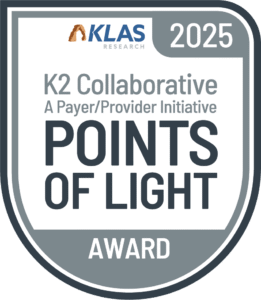 Largest Health Information Network Is Recognized for Streamlining Clinical Data Exchange in Support of CMS Interoperability and Prior Authorization Final Rule
Largest Health Information Network Is Recognized for Streamlining Clinical Data Exchange in Support of CMS Interoperability and Prior Authorization Final Rule
eHealth Exchange once again has been recognized by KLAS Research with a prestigious Points of Light and Peak Award for its groundbreaking work in health data interoperability. The recognition stems from a collaborative case study titled “Automating Prior Authorization via a Networked FHIR Service,” which showcases a scalable solution to one of healthcare’s most burdensome administrative processes.
The case study spotlights how payer Regence and provider MultiCare created a Fast Healthcare Interoperability Resources® (FHIR®)-based solution to streamline prior authorization workflows in partnership with eHealth Exchange. The solution also supports payer-to-payer exchange and complies with the Centers for Medicare & Medicaid Services (CMS) Interoperability and Prior Authorization Final Rule (CMS-0057-F).
“KLAS’ recognition of this initiative affirms the industry’s need for practical, scalable solutions that reduce administrative burden and improve patient care,” said Jay Nakashima, president of eHealth Exchange. “We’re honored to be working alongside visionary partners such as Regence and MultiCare to demonstrate the real-world impact of interoperable, FHIR-based data exchange.”
The collaboration focused on solving a widespread challenge: The manual, time-consuming process of verifying prior authorization requirements and exchanging related data across disparate systems. Leveraging Health Level Seven (HL7®) FHIR Da Vinci Project standards and eHealth Exchange’s hub-and-spoke architecture, the team demonstrated that a single technical connection enables secure, real-time data exchange with many partners—dramatically accelerating response times and increasing efficiency.
Among the notable outcomes of the initiative:
- Real-time API responses delivered in seconds, eliminating the need for phone, fax, and portal access.
- When determining whether prior authorizations are required, the system responds within 20 seconds 99% of the time.
- More than 85% of prior authorization requests determined do not require approval, saving time for both providers and payers.
- The eHealth Exchange Networked FHIR service is also being used by payers to retrieve clinical data (CDex) from health systems to fulfill Healthcare Effectiveness Data and Information Set (HEDIS) measures in an automated way. It can be used for payer-to-payer exchange (PDex).
The project was facilitated under the umbrella of the Trebuchet Collaborative, a national consortium now involving more than 15 payer organizations, 10 healthcare systems, 20 vendors, and three organizations with Qualified Health Information Networks® (QHINs™) designation. The collaboration builds upon how FHIR is expected to work under the Trusted Exchange Framework and Common Agreement™ (TEFCA™). In parallel, eHealth Exchange and Leavitt Partners helped launch the One Utah Health Collaborative, a statewide initiative supporting scalable FHIR implementation and serving as a model for other states and regions.
With the CMS-0057-F rule requiring implementation of APIs for prior authorization by 2027, eHealth Exchange is investing in educational resources and expanded FHIR services to assist healthcare and payer organizations in achieving compliance and unlocking greater value from clinical data exchange.